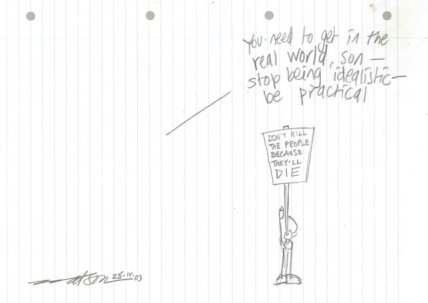Something nice for Valentine’s day I think…
It is so often said that war is natural part of human behaviour that many people just accept it. Conflict or disagreement certainly might be, but full-on war is a different matter.
Most people know about the 1914 Christmas Truce in WW1 when the British and German soldiers played football and exchanged gifts (note for some readers - WW1 started in 1914, not 1917 and WW2 started in 1939, not 1941).
This is usually presented as a one-off - a freak occurrence, but that simply isn’t true. It also happened in 1915 with the Germans and the French and in 1916 there was a truce on the Eastern front.
When I was at school and computers were in their 64k stage, we were given a programme to play around with in one history lesson. Extremely basic though it was, the idea was that you were the British General deciding what tactics you could use to defeat the Germans in World War 1 given the tactics and equipment of the time.
The trick was that, although it was possible to win the game, it wasn’t possible to do it without a bloodbath on both sides. I think it, in its own way, was meant to be a little anti-war statement.
However, the game didn’t give you the option of simply not attacking, and not attacking was the way that many people survived in World War One.
In the earlier stages of the war informal truces sprung up all over the place. Both sides would aim artillery far and wide; this was understood as an offering of peace and reciprocated. In many places it then became a kind of game. Snipers would aim to miss but in a showing-off ‘look what I can hit’ way. This was partly to pass the time and partly to warn that if the truce was broken then there was a capability of reprisal. Contrary to popular belief the conflict was very low-intensity in many places at different times. There are many eyewitness accounts of the soldiers apologising to each other for firing too near.
This changed, of course, when the officers - the ones far removed from the front line that is - heard about it. They were appalled by this sort of behaviour and devised new tactics like surprise raids and so on which destroyed the fragile trust that opposing soldiers had built up.
After the war it was the generals that had insisted on the continuation of mass random slaughter that were awarded medals and had statues of each other erected. Of the officers in the field who insisted on pressing on, well, many of them were shot in the back by their own side as they advanced toward the opposing army.
In many societies around the world in pre-industrial times, the object of war was not the genocide of the opposing group, but rather their humiliation. From some of the Native Americans to societies in Africa, actual fatalities were very unusual. Some sources even describe what is essentially a high-intensity game of tag (involving a smack with a stick). In other places a tit-for-tat, one of yours for one of ours kind of conflict often persisted over a long time, but without an eruption into absolute warfare.
It may be that there is a part of our genetics that leads us toward conflict, but it is certainly not the cause of the mass slaughters that have happened through history. Rome wanted to conquer; other groups wanted to live and let live. Genghis Khan would wipe out thousands; other groups at the time didn’t.
It is demonstrably untrue that the Romans and other groups throughout history that have conducted and are conducting mass slaughter and conquest on the genocidal scale are genetically diverse enough from those living next to them to have a different set of genetic imperatives, so it must be societal conditions that lead to this kind of behaviour. And as we all know, societal conditions can change.
Why mention all this today?
Today is an anniversary. Not valentines day, but the anniversary of an atrocity carried out by British and American forces in World War 2 - the bombing of Dresden, which occurred on the night of the 13th/14th February 1945 when the war was nearing its end. Dresden was not regarded as a strategically important city, which is why it hadn’t been bombed up until then. Russian troops were also closing in on the city.
The BBC, in their ‘On This Day‘ section are showing the report from 1945 and there is a little section which says..
(Note: You can view every article as one long page if you sign up as an Advocate Member, or higher).






